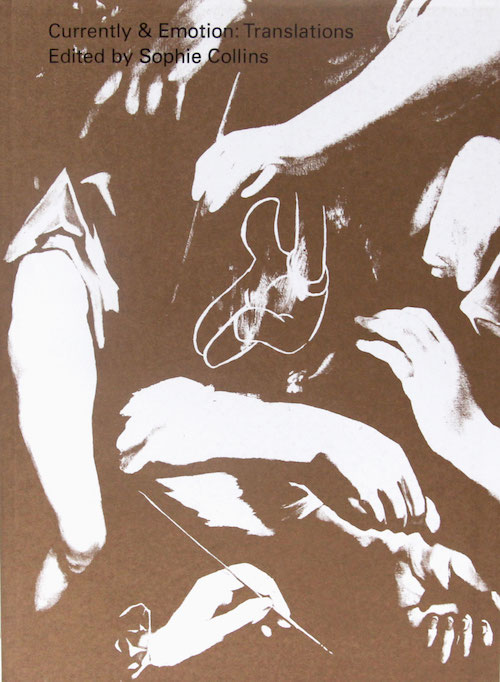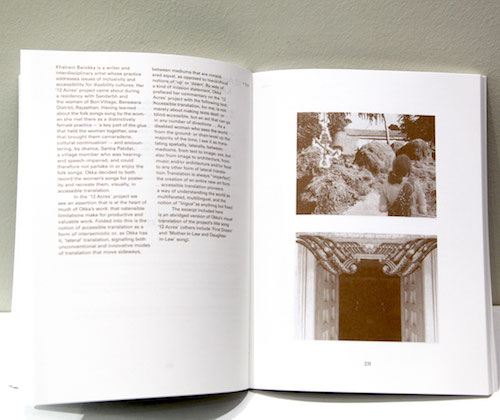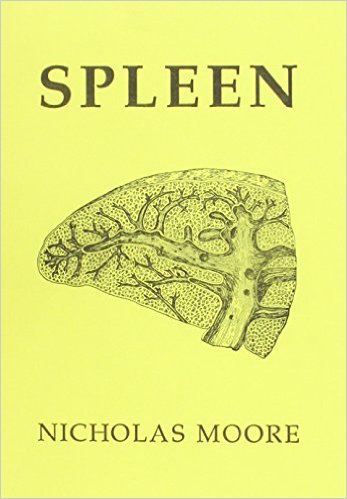By Several Hands: On Currently & Emotion & Nicholas Moore
BY Oli Hazzard

At the beginning of November, I read some poems alongside Tara Bergin and (appearing via recorded video) Don Mee Choi and Sawako Nakayasu at the Fruitmarket Gallery in Edinburgh, to celebrate the launch of a new anthology of translations, Currently & Emotion, edited by Sophie Collins and published by Test Centre. I’ve been carrying the book around with me ever since, and it’s one of the most challenging, provocative and idea-crammed collections I’ve read all year. (I should say that I have a few poems in there; please assume that I’m excepting those from the praise I will be lavishing on the book as a whole.) The anthology features twenty-nine poetic works in which the role of the translator is foregrounded, in order to illuminate and counteract what the translator and theorist Lawrence Venuti has termed “the translator’s invisibility.” The introduction outlines clearly and rigorously how the current marginalisation of the translator (particularly in Anglophone literary cultures) is reflective of other, intimately-related asymmetries of power, and indicates the numerous, complex ways in which translation intersects with feminist and postcolonial theory. Collins articulates the aims of the anthology in these terms:
Shifting our perception of translation from that of a kind of literary device that simply facilitates access to foreign and/or historical texts, to one that recognises an influential, political and manipulative act, is vital, because when ‘representation’ is viewed as something unproblematic, capable of providing ‘direct, unmediated access to a transparent reality’ (where ‘reality’ also remains unquestioned), translation does nothing but reinforce hegemonic versions of the colonised, presenting individuals as ‘objects without history’. [The quotes here drawn from Tejaswini Niranjana’s Siting Translation: History, Post-Structuralism and the Colonial Context.]
The work that follows is dazzling in its variety, invention, and the sophistication of its thinking about the translation process. One of the most surprising things about the book is the plasticity of the term “translation” in Collins’s usage and editorial application of it. Under this rubric are brought together Rachael Allen’s ekphrastic 4Chan poems; Khairani Barokka’s “lateral translations” of Rajasthani folk songs into images; Sandra Doller’s rendering of Eric Suchère’s “Mystérieuse,” itself a series of detailed descriptions of panel-backgrounds from the Tintin adventure “L’Etoile Mystérieuse”; and Caroline Bergvall’s mixture of Chaucerian and contemporary Englishes in a poem responding to Pope John Paul II’s “Letter to Women.” Despite this procedural and conceptual variety there are some fascinating continuities between the works. One of these, I think, is a desire for the multiple occasions and locations of reading and writing to be somehow inscribed in the text. Rather than eliding the scattered and staggered histories of each work, as so many translations (sometimes justifiably) do, many of the poems included here use the interval between initial composition and later translation as an opportunity to expose, consider and disturb other, murky states of betweenness: between intention and accident, creation and duplication, dreams and waking life, work and leisure, prose and poetry, self and other, one day and the next.

The included excerpt from Anne Carson’s The Albertine Workout—available to read in full here—throws many of these states sharply into relief. The numbered sections divide what could be presented as a continuous, discursive, wry account of Albertine’s role in In Search of Lost Time into discrete parts. This seems to me to be an oblique formal registration of the numerous occasions and locations of reading that Proust’s massive novel necessitates, and how those different places and times become somehow magically connected to one another, almost as a parallel index of a life’s progress. (It invites a fantasy / nightmare of another world in which age is not determined by years but by progress through Proust, attractive maybe for the sole reason that you could determine the pace at which you hurtled toward maturity and death. By this measure, next year I’m planning to turn In the Shadow of Young Girls in Flower.) Just as importantly, the fragmentariness of the piece appears as a pointed statement of stylistic difference from Proust. As Collins notes, the title of the piece simultaneously refers to celebrity exercise videos, Marcel’s urge to “work out” Albertine, as well as Carson’s own very different working out of her, which is more of a statistically-based evaluation of her representation (“Albertine’s name occurs 2363 times in Proust’s novel, more than any other character.”); but (more conjecturally) it also seems to be a performative mode of escape from Proust, a way of getting “out” from his novel by producing “work” about Albertine. The following passage seems to be about the stark difference between the passivity and obedience of the disenfranchised Albertine and the active, disobedient reading practices of the contemporary translator:
22.
Albertine has no family, profession or prospects. She is soon installed in Marcel’s house. There she has a separate bedroom. He emphasises that she is nonetheless an ‘obedient’ person. (See above on Albertine as a ‘heavy slave’.)
These considerations are also explored in another variation on Proust, Zoë Skoulding’s “In Search of Lost Time,” a series of poems constituted of text thrown up by googling the titular phrase. These poems produce a series of bewildering temporal effects by arranging the attempts of different discourses to notate time’s passage; here is the vertigo of geological time and the terrifying accelerations of the present, the time-bending experience of reading and the horror of memory loss, the warped index of advertising and the miraculous time-stamp of poetry, all melded together in an impossible “magic form”:
He would suddenly be aware that he could not
remember even time-lapse cameras recording glaciers.
A reasonable attempt will be made to replace time lost
but there is no magic form. Ask your doctor to complete
a press release pertaining to cloud estimates after
earthquakes.
How can one hold joy and grief in the mind at the same
time?
Blame advertising slowdown, or the growing literature
on the economics of migraine. Little is known about
why subjective time loss occurs after a novel experience
but mice allowed to sleep after being trained help you
shed flab in a jiffy. Between accident and absence
the world had changed into something unrecognisable.
As with Skoulding’s work, there is in Venuti’s translations of the Galician poet J. V. Foix a vivid sense of the dailiness and materiality of writing, but rendered in a very different manner. His translation of “Daybook, 1916” is a series of prose pieces in which dream-like narratives are presented with extraordinary clarity. This particular passage has the surgical angles, blocky plateaus and unnervingly naturalistic atmosphere of a De Chirico painting:
The sea, that morning, was a solid rectangle, colourless and transparent as crystal. On its surface stood celluloid figures, strange and sui generis, projecting themselves obliquely in long, immeasurable shadows shaped like cones and cylinders. The fishermen, after recovering from their surprise, affirmed that they were the skeletons of stars, expelled from the depths of the sea when that phenomenon was produced.
Sawako Nakayasu’s translations of Sagawa Chaka are particularly sensitive to the possibilities and pitfalls of that moment of indecision before choosing one word over another. Like Bergin’s “By Several Hands” (which reproduces different translations of a single sentence from Madame Bovary), multiple versions of the same text are presented consecutively, though in this instance they’re also interleaved with a number of seemingly-unrelated, nightmarish prose pieces. Rather than having a definitive rendering of a text, the different versions are suspended in equilibrium, a series of parallel universes distinguished from one another by only the slightest of details in perception or phrasing. Reading them feels like looking at the same building at different times of day, or in different moods, or with a different person standing next to you. Here are two of the versions:
PROMENADE
(PUROMANAADO 1)Season bag
Reported buried in flower
Thin day
Three o’clock afternoon
Black screen white
Hitomi cloud cover
Sunset boundPROMENADE
(PUROMANAADO 3)Seasonal gloves
Flowers embedding media
Trace of sun
At 3:00pm
White mastermind
Clouds covered the pupil
Higurashi promise
One of the moving, energising things about this sequence of poems, and the rest of this wonderful book, is the sense it gives of the vast range of possibilities a poem introduces into the world, itself multiplied and illuminated through its passage between minds, languages and cultures. I recommend it to everyone.
Nakayasu’s versions sent me back, this week, to one of my favourite and what seems now to be one of the most prescient translation projects of the last century, Nicholas Moore’s thirty-one versions of Charles Baudelaire’s “Spleen.” Moore, who died in obscurity in 1986, is a classic poet’s poet’s poet: his work is cherished and championed by a wide array of figures, including J.H. Prynne, Peter Riley, Roy Fisher and John Yau, but has somehow never received the widespread acclaim, or at least sustained attention, it deserves. (This is hopefully going to change, with the recent publication by Shoestring Press of a substantial Selected Poems, edited by John Lucas and Matthew Welton; the latter himself a poet of pungent Mooreian flavour.) The Baudelaire versions were produced for a translation competition run by the Sunday Times in 1968, judged by George Steiner. As Moore explains in his brilliant, rambling preface to the Menard Press edition of the complete Spleen, they emerged from an intuitive distrust of the idea that accurate translation were possible or even desirable (“All I have against translation is it can’t be done!”), a sense that the role of the translator was to relate the work translated to the contemporary world with an “astringent wit, and a bite at things that need biting,” and a belief that this could be achieved by melodramatically foregrounding the tragic, comic figure of the translator, who by his (Moore’s pronoun) very failure to erase the distinctive “grammar of his being” can highlight the fact that all poetry, or indeed any act involving language, can be thought of as an act of translation.

The poems themselves are remarkable for their formal variety, tart, punning wit, sudden, unexpected vents of feeling, and cartoonish trolling of a wide array of poets and institutions. Each version is supplemented with an elaborate scaffold of dedications, epigraphs and usually-fictional authorial monikers, which, while often being simply very funny (in a mode that Roy Fisher in his Foreword identifies as the “wacky, knuckle-cracking, self-generated glee of the isolate”) also indirectly calls attention to the culture industry of the period. I get the sense Moore would have agreed with Collins’s assertion that there are some poet-translators who work, at least in part, “in order to increase cultural capital, by enabling the poet to attach his name to that of the source text author.” (Incidentally, Moore claimed no special affinity with his source-poet: “Of Baudelaire himself I have not read much; I don’t have a particular interest in him.”) There are submissions postmarked “Henri Yellowvine, c/o The Adventurous Publicity Department, John Murray Ltd.,” “G. Martian-Foldero, c/o Shell-Eel Wild Oil Preservation Trust, James ‘Humanist’ Fisher-King, c/o B.B.C.,” “Alan Boldero, c/o Scatto & Findus, King Elizabeth 2nd Street, Hair” . . . I could list them all. In the poems themselves, Moore shuffles breezily through a roster of canonical modernist voices, often supplying a sharp satirical jab in the process. “I’ve Got a Right to Sing the Blues” is authored by one W.H. Laudanum; “Monsieur Boule de L’Air,” one of many versions produced under the spell of Stevens, opens with: “I’m like the Father Christmas of a wet / And ungay country”; “Le Roy Delycieux de l’Ici,” with “I am like the T.S. Eliot of new wastelands”; while “Song,” which tries on the palette of H.D. (or rather “H.N. — Helga Nevatoomuch”), begins with these bewitching lines:
Brown blotch grey veins
petal of iris
on my canopy:
cool beauty
Some of the versions are more pointedly political. One, titled “Rat-King,” is dedicated to “Stergene MacArthury and Lesbert Blowall,” attributed to “H.R. Fixon-Boumphrey (President Elect of the Society for Multiple Injuries) c/o The Hamerican Impassy, Growvenal Square, Westpoint I,” and opens with these near-prophetic lines: “I’m like the Fuhrer of some Southern State, / Too young for President, too old for mate, / Sick of the intellectuals . . .” Intriguingly, the single version attributed to Nicholas Moore, with his correct address, is about King Juda of the Bikini Atoll, the islands whose populace was forcibly removed in 1946 so that American atomic tests could be carried out. Because it is about a real person, and real suffering, above all the other versions it places the most pressure on Baudelaire’s opening salvo: “Je suis comme…” But it also makes clear Moore’s understanding that the necessary failure of the act of translation does not, of course, preclude the desire and the effort to translate, just as the impossibility of “an identity transplant” doesn’t preclude the difficult work of empathy or solidarity. Both Collins’s remarkable anthology, and Moore’s weird, frightening poem—the final lines of which I’ve reproduced below—in different but related ways foreground the urgency of that ongoing work of listening and making, of biting at the things that need biting, in this deranged historical moment:
The Roman bloodbaths weren’t a patch on this;
If they made old men smile, this is death’s kiss.
Strontium can’t warm anything but weeds;
My blood grows green with gangrene in the weeds.
Oli Hazzard is the author of two books of poems, Between Two Windows (Carcanet, 2012) and Within Habit...
Read Full Biography

